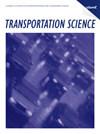基于机器学习的铁路班组调度优化
IF 4.4
2区 工程技术
Q1 OPERATIONS RESEARCH & MANAGEMENT SCIENCE
引用次数: 0
摘要
在机组调度中,当目标函数中包含大量的惩罚项以考虑规划者的偏好时,优化模型会变得复杂。计划者的偏好通常包括非货币方面,这方面的数学公式和适当惩罚成本的分配都是困难的。我们通过使用机器学习来学习和预测规划者的偏好来解决这个问题。在铁路班组调度中,我们根据计划员的日常工作反馈训练随机森林分类器。我们的数据集包含了超过16000个被计划者标记为好或坏的任务。经过训练的模型预测了一项任务被规划者认为是糟糕的可能性。我们提出了一种新颖的方法,将机组调度优化模型中的大型惩罚项结构替换为单个惩罚项,该惩罚项与被计划者评估为不利的预测概率成比例。通过将这个概率集成到优化模型中,我们生成了包含更多具有首选特征的任务的调度。与使用一组多重惩罚条款的原始方法相比,我们将计划者的平均接受概率提高了12%以上,同时只面临成本的边际增加。我们的方法结合了机器学习来检测有关有利任务特征和优化的复杂模式,以创建可行且具有成本效益的机组时间表。补充材料:在线附录可在https://doi.org/10.1287/trsc.2022.1196上获得。本文章由计算机程序翻译,如有差异,请以英文原文为准。
Using Machine Learning to Include Planners’ Preferences in Railway Crew Scheduling Optimization
In crew scheduling, optimization models can become complex when a large number of penalty terms is included in the objective function to take planners’ preferences into account. Planners’ preferences often include nonmonetary aspects for which both the mathematical formulation and the assignment of appropriate penalty costs can be difficult. We address this problem by using machine learning to learn and predict planners’ preferences. We train a random forest classifier on planner feedback regarding duties from their daily work in railway crew scheduling. Our data set contains over 16,000 duties that planners labeled as good or bad. The trained model predicts the probability that a duty is perceived as bad by the planners. We present a novel approach to replace the large construct of penalty terms in a crew scheduling optimization model by a single term that penalizes duties proportionally to the predicted probability of being assessed as unfavorable by a planner. By integrating this probability into the optimization model, we generate schedules that include more duties with preferred characteristics. We increase the mean planner acceptance probability by more than 12% while only facing a marginal increase in costs compared with the original approach that utilizes a set of multiple penalty terms. Our approach combines machine learning to detect complex patterns regarding favorable duty characteristics and optimization to create feasible and cost-efficient crew schedules. Supplemental Material: The online appendix is available at https://doi.org/10.1287/trsc.2022.1196 .
求助全文
通过发布文献求助,成功后即可免费获取论文全文。
去求助
来源期刊

Transportation Science
工程技术-运筹学与管理科学
CiteScore
8.30
自引率
10.90%
发文量
111
审稿时长
12 months
期刊介绍:
Transportation Science, published quarterly by INFORMS, is the flagship journal of the Transportation Science and Logistics Society of INFORMS. As the foremost scientific journal in the cross-disciplinary operational research field of transportation analysis, Transportation Science publishes high-quality original contributions and surveys on phenomena associated with all modes of transportation, present and prospective, including mainly all levels of planning, design, economic, operational, and social aspects. Transportation Science focuses primarily on fundamental theories, coupled with observational and experimental studies of transportation and logistics phenomena and processes, mathematical models, advanced methodologies and novel applications in transportation and logistics systems analysis, planning and design. The journal covers a broad range of topics that include vehicular and human traffic flow theories, models and their application to traffic operations and management, strategic, tactical, and operational planning of transportation and logistics systems; performance analysis methods and system design and optimization; theories and analysis methods for network and spatial activity interaction, equilibrium and dynamics; economics of transportation system supply and evaluation; methodologies for analysis of transportation user behavior and the demand for transportation and logistics services.
Transportation Science is international in scope, with editors from nations around the globe. The editorial board reflects the diverse interdisciplinary interests of the transportation science and logistics community, with members that hold primary affiliations in engineering (civil, industrial, and aeronautical), physics, economics, applied mathematics, and business.
 求助内容:
求助内容: 应助结果提醒方式:
应助结果提醒方式:


